Are you curious about which SaaS companies are poised for success in 2023?
As technology continues to advance, software-as-a-service (SaaS) has become an increasingly popular choice for businesses seeking scalable, efficient solutions.
That’s where we come in. We’ve scoured the industry and narrowed down the top 10 SaaS companies to keep your eye on in 2023.
So, whether you’re a business owner looking for the next big thing, or simply a tech enthusiast keeping up with the latest trends, you’re in the perfect place. We’ll provide a brief overview of each company’s history, the problems they solve, and some interesting insights you may not be aware of.
10 SaaS Companies Making Moves In 2023
Stripe
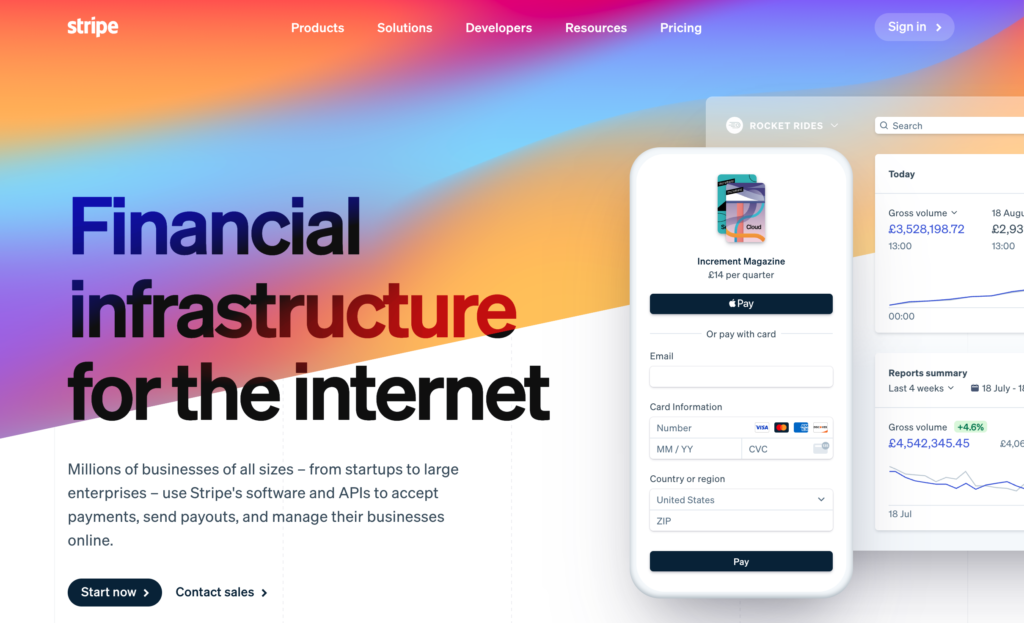
Company Overview: Stripe is a privately held company founded in 2010 by Irish brothers Patrick and John Collison. The company’s headquarters is located in San Francisco, California, and it has offices in several countries around the world.
Products and Services: Stripe’s main product is its payment processing software, which allows businesses to accept online payments from customers via credit card, debit card, and other payment methods. Stripe also offers other related services, such as fraud prevention, subscription management, and invoicing.
Target Market: Stripe primarily serves small-to-medium-sized businesses (SMBs), as well as larger enterprises. The company’s services are particularly popular among e-commerce businesses and startups, as they offer a simple and easy-to-use payment processing solution.
Business Model: Stripe operates on a software-as-a-service (SaaS) business model, where customers pay a monthly or transaction-based fee to use its services. Stripe also earns revenue from value-added services, such as chargeback protection and custom integrations.
Funding: Stripe has raised over $2 billion in funding from several high-profile investors, including Sequoia Capital, Andreessen Horowitz, and Elon Musk. The company’s most recent valuation was $95 billion, making it one of the most valuable private companies in the world.
Interesting Points about the Brand: Stripe’s founders, Patrick and John Collison, were both included in Forbes’ list of the world’s youngest self-made billionaires.
Stripe has a reputation for being a developer-friendly company, offering a simple and easy-to-use API (application programming interface) that allows businesses to integrate its payment processing services with their websites and applications.
Stripe has a strong focus on security, offering features such as two-factor authentication, encryption, and PCI compliance.
Stripe has been named one of the world’s most innovative companies by Fast Company, and has won several awards for its products and services.
Slack
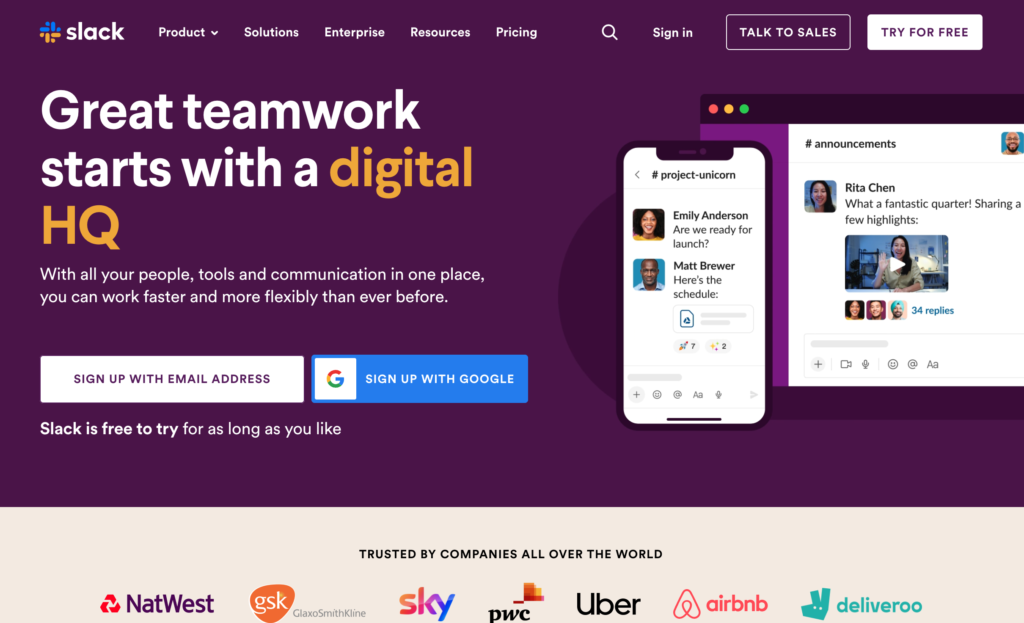
History: Slack was founded in 2013 by Stewart Butterfield, Cal Henderson, Eric Costello, and Serguei Mourachov. The company was originally started as an internal tool for their gaming company, Tiny Speck before they realized the potential for a standalone product and Slack was officially launched in 2014.
Platform: Slack is a cloud-based platform that provides real-time messaging, file sharing, audio and video conferencing, and integration with other software tools. The platform is available on desktop and mobile devices.
Users: Slack is used by millions of people worldwide, including teams at companies such as Airbnb, Shopify, and NASA. In 2020, the company reported having over 12 million daily active users.
Funding and Valuation: Since its launch, Slack has raised over $1.4 billion in funding and has a current market capitalization of over $25 billion.
Branding: Slack’s branding is playful and approachable, with bright colours and whimsical illustrations. The company’s logo features a hashtag symbol, which is a nod to the platform’s use of channels and hashtags to organize conversations.
Company Culture: Slack is known for its unique company culture, which includes a focus on inclusivity, diversity, and transparency. The company also has a number of quirky traditions, such as the “Emoji Art Gallery,” where employees create art using only emojis.
Acquisitions: In 2019, Slack acquired the email app Astro, which allowed users to manage their email and calendar within Slack. The company has also acquired other companies, including the AI-powered chatbot startup, Missions.
Competition: Slack faces competition from other communication and collaboration platforms, including Microsoft Teams, Google Meet, and Zoom. In 2020, Slack filed an antitrust complaint against Microsoft, alleging that the tech giant was unfairly promoting Teams over other communication platforms.
Acquisition: In December 2020, Salesforce announced its acquisition of Slack for $27.7 billion, making it one of the largest software acquisitions in history. The deal is expected to close in mid-2021.
All in all, Slack is a popular and successful SaaS company that has revolutionized the way teams communicate and collaborate. With a unique brand and company culture, Slack has made a lasting impact on the world of business and technology.
Zoom
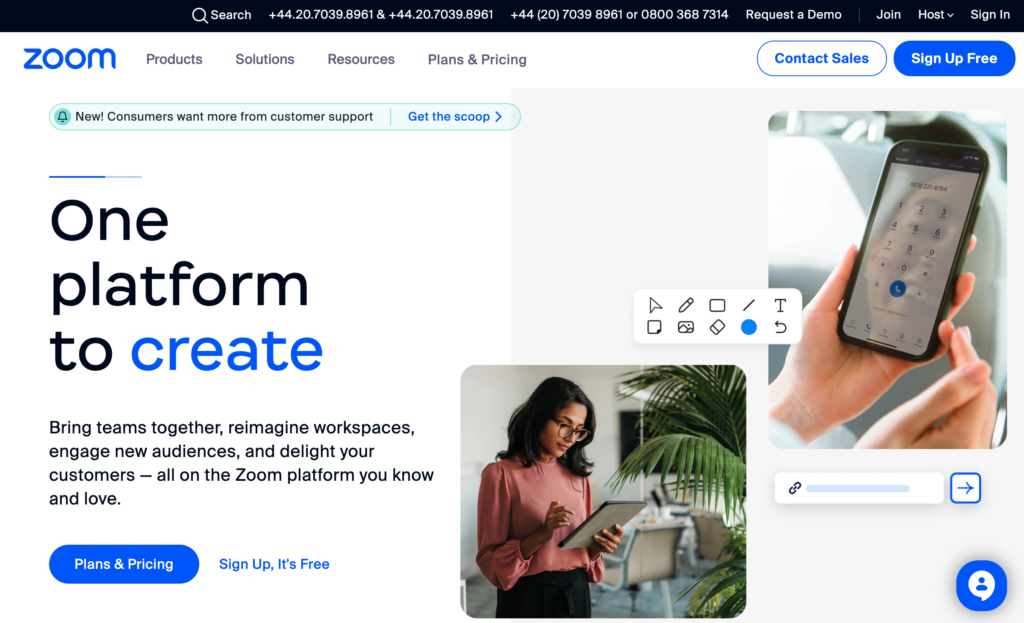
History: Zoom was founded in 2011 by Eric Yuan, who previously worked at Cisco Webex. The company was initially called Saasbee but was later rebranded as Zoom in 2012.
Platform: Zoom provides video conferencing, web conferencing, webinars, and collaboration tools and easily integrates with other software tools.
Users: Zoom experienced explosive growth during the COVID-19 pandemic, when people switched to remote work and virtual meetings. As of January 2022, the company reported having over 175 million daily active users.
Funding and Valuation: Zoom went public in April 2019 and has a current market capitalization of over $100 billion. The company has raised over $1 billion in funding.
Branding: Zoom’s branding is straightforward and professional, with a blue and white color scheme. The company’s logo features a camera lens, which represents the platform’s video conferencing capabilities.
Security and Privacy: Zoom faced criticism for security and privacy issues, including “Zoom bombing,” where uninvited users join meetings and disrupt them. The company has taken steps to address these concerns, including implementing end-to-end encryption and two-factor authentication.
Company Culture: Zoom has a strong culture that emphasizes customer focus, teamwork, and innovation. The company has a flat organizational structure, and employees are encouraged to take ownership of their work.
Competition: Zoom faces competition from other video conferencing platforms, including Microsoft Teams, Google Meet, and Cisco Webex.
Expansion: In addition to video conferencing, Zoom has expanded its offerings to include a phone system and a cloud contact centre. The company also launched a virtual events platform called OnZoom in 2020.
Philanthropy: Zoom has donated millions of dollars to support COVID-19 relief efforts, including the donation of licenses to healthcare providers and schools. The company has also committed to reducing its carbon footprint and becoming carbon neutral by 2022.
Overall, Zoom is a widely used and successful SaaS brand that’s become an essential tool for remote work and virtual meetings.
Asana
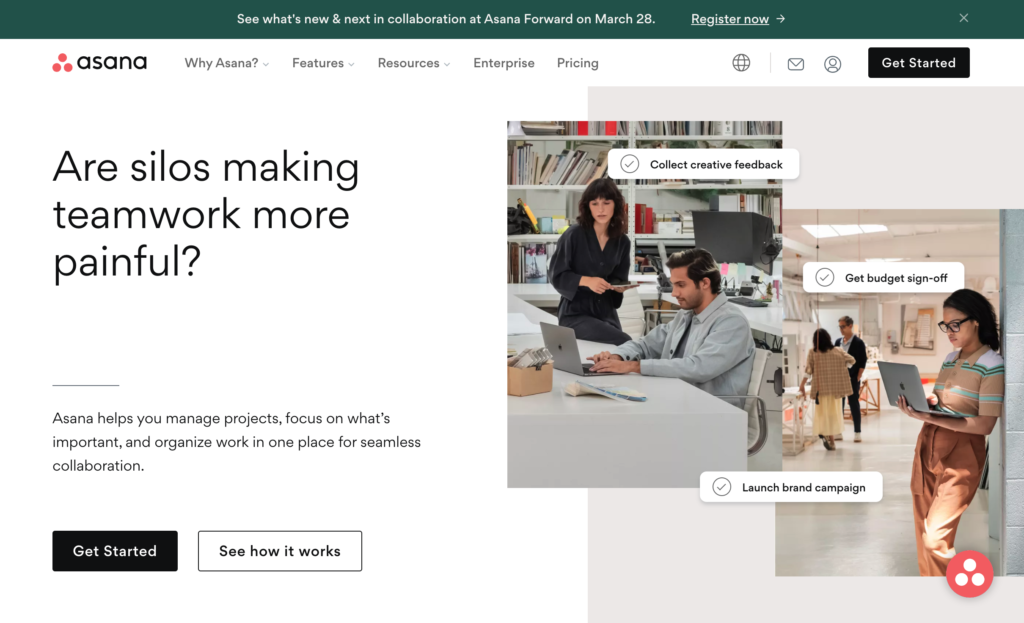
History: Asana was founded in 2008 by Dustin Moskovitz and Justin Rosenstein, who both previously worked at Facebook before it was launched publicly in 2011.
Platform: Asana provides a tool for team collaboration and project management, task tracking, communication tools, and team dashboards.
Users: As of 2021, Asana has over 100,000 paying customers, including teams at companies such as Uber, NASA, and The New York Times.
Funding and Valuation: Asana went public in 2020 and has a current market capitalization of over $12 billion. The company has raised over $213 million in funding.
Branding: Asana’s branding is clean and minimalistic with a blue and white colour scheme.
Company Culture: Asana has a strong company culture that emphasizes transparency, collaboration, and diversity. The company has a flat organizational structure, and employees are encouraged to take ownership of their work.
Philanthropy: Asana has a philanthropic arm, the Asana Impact Program, which provides grants and resources to nonprofit organizations. The company has also committed to becoming carbon neutral by 2022.
Competition: Asana faces competition from other project management and team collaboration platforms, including Trello, Monday.com, and Basecamp.
Expansion: In addition to its core project management platform, Asana has expanded its offerings to include workflow automation tools, a timeline view, and a portfolio view for tracking multiple projects.
Productivity Research: Asana conducts research on productivity and workplace culture, and shares the findings on its blog and in its annual report, “The Anatomy of Work.” The company also hosts events and webinars on these topics.
Asana is a successful SaaS company that has become an essential tool for project management and team collaboration. With a strong brand and company culture, Asana is well-positioned for continued growth in the future.
HubSpot
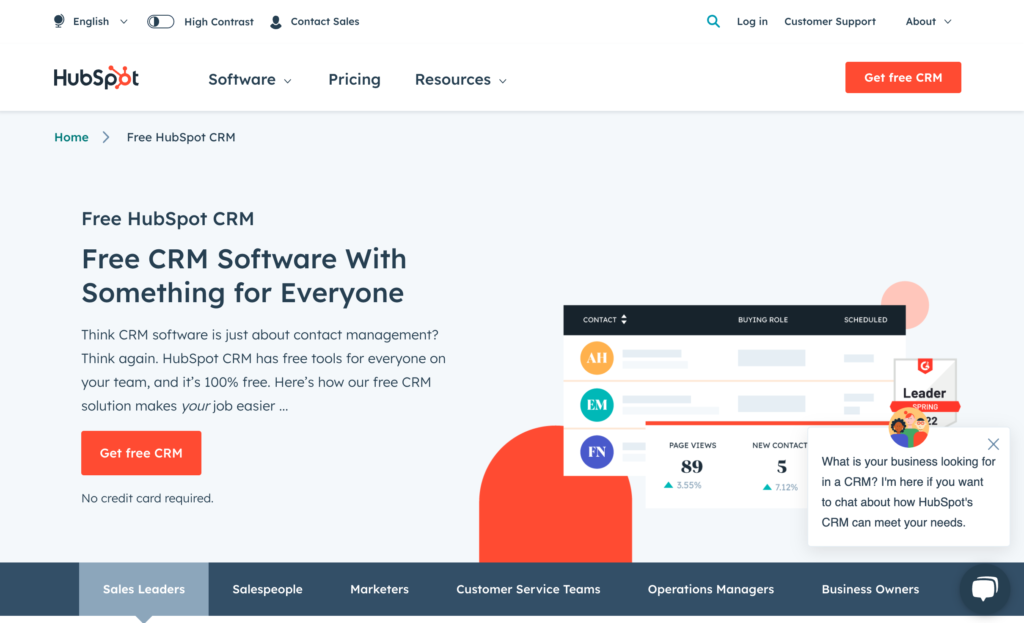
Company Overview: HubSpot was founded in 2006 in Cambridge, Massachusetts, and went public in 2014. The company’s mission is to help businesses by providing them with a suite of software tools that help them attract, engage, and retain customers.
Product Offerings: HubSpot offers a range of software products, including a CRM, marketing automation software, sales software, customer service software, and content management software. These products are designed to work together seamlessly, allowing businesses to manage their entire customer journey in one platform.
Target Market: HubSpot’s software is targeted towards small and mid-sized businesses. The company’s software is designed to be user-friendly and easy to use, even for those who have no prior marketing or sales experience.
Interesting Points About the Brand:
a. In 2018, HubSpot launched a new brand identity, including a new logo and colour scheme.
b. HubSpot is known for its “inbound marketing” methodology, which is based on the idea of attracting potential customers through valuable content and experiences.
c. HubSpot has a strong commitment to corporate social responsibility, with initiatives such as their Impact program, which provides free software to non-profits and social enterprises, and their Green Spot program, which aims to reduce the company’s carbon footprint.
d. The company has been recognized as a “Best Place to Work” by Glassdoor and Forbes.
HubSpot is a leading SaaS company that provides a suite of software tools to help businesses grow. The company is known for its commitment to innovation, simplicity, corporate social responsibility, and employee happiness.
DocuSign
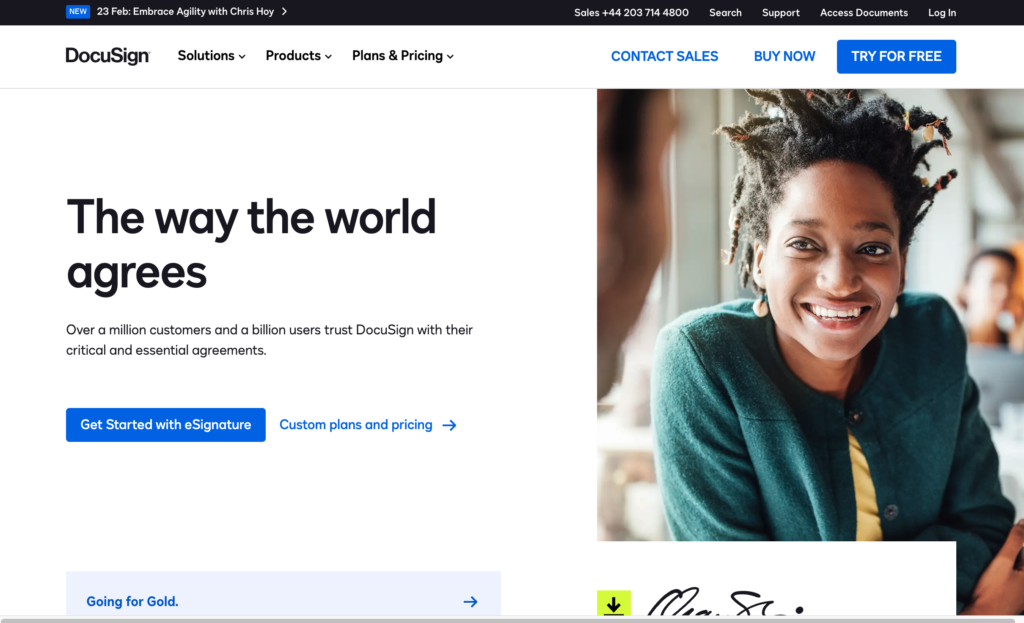
Company History: DocuSign was created in 2003 by Tom Gonser at its headquarters in San Francisco, California, USA. The company launched its first product in 2004, which enabled the electronic signing of agreements and contracts. DocuSign went public in 2018 and is listed on the NASDAQ stock exchange under the ticker symbol DOCU.
Products and Services: DocuSign’s main product is its electronic signature solution, it allows users to sign, send, and manage documents digitally.
Customers: DocuSign has a diverse customer base, ranging from small businesses to Fortune 500 companies. Its customers come from a variety of industries, including real estate, financial services, healthcare, government, and technology.
Market Leadership: DocuSign is considered the market leader in the electronic signature and digital transaction management industry, with a market share of over 70%. The company has been recognized by industry analysts, such as Gartner and Forrester, for its innovative solutions and excellent customer service.
Environmental Sustainability: DocuSign is committed to reducing its environmental impact and has set ambitious goals to achieve this. The company aims to achieve net-zero carbon emissions by 2050 and has already made progress by using renewable energy and reducing its waste.
Awards and Recognition: DocuSign has won numerous awards and recognitions for its products, services, and corporate culture. In 2020, the company was ranked #3 on Fortune’s Best Workplaces in Technology list and #10 on Fortune’s Best Workplaces for Millennials list.
Partnerships: DocuSign has formed strategic partnerships with a range of companies, including Microsoft, Google, Salesforce, and Dropbox. These partnerships help to integrate DocuSign’s solutions with other software and services and increase the company’s reach and market share.
To summarise, DocuSign is a leading SaaS company that has revolutionized the way businesses handle electronic signatures and document management. The company’s commitment to innovation, customer service, and environmental sustainability has helped it maintain its market leadership position and win the trust of customers and partners worldwide.
Atlassian
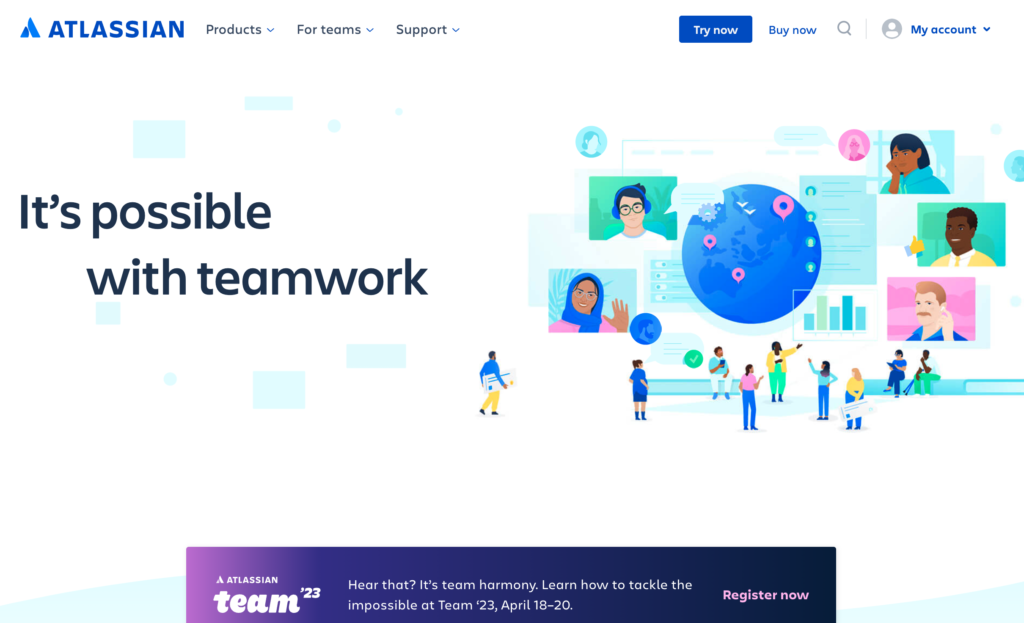
Company History: Atlassian was founded in 2002 by Scott Farquhar and Mike Cannon-Brookes in Sydney, Australia. Development began with Jira, a bug and issue-tracking tool for software development teams.
Products and Services: Atlassian’s products include Jira Software, Confluence, Bitbucket, Trello, and others. These tools help teams collaborate, track progress, and manage projects.
Customers: Atlassian has a diverse customer base, ranging from small startups to large enterprises.
Company Culture: Atlassian values transparency, teamwork, and autonomy, and Atlassian’s culture has been recognized by industry analysts, such as Glassdoor and Great Place to Work, helping them to attract and retain top talent.
Environmental Sustainability: Atlassian has committed to achieving net-zero carbon emissions by 2050 and has implemented initiatives to reduce its waste and water usage.
Open Source: The company has released some of its own software as open source, including its Jira Service Desk and Confluence tools.
Growth and Expansion: Atlassian experienced rapid growth and expansion since its founding. The company went public in 2015 and is listed on the NASDAQ stock exchange under the ticker symbol TEAM.
Atlassian has also expanded through acquisitions, including the acquisition of Trello in 2017 and the acquisition of AgileCraft in 2019.
Overall, Atlassian is a leading SaaS company that has revolutionized the way software development teams collaborate and manage projects. The company’s commitment to innovation, company culture, and environmental sustainability has helped it maintain its market leadership position and win the trust of customers and partners worldwide.
Twilio
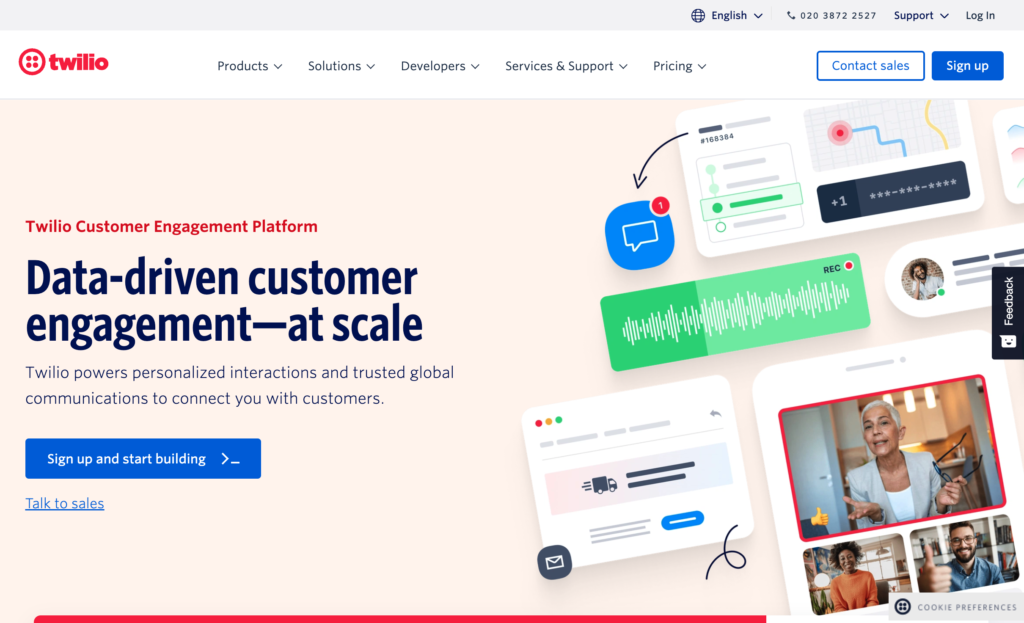
Company Overview: Twilio was founded in 2008 in San Francisco, California, and went public in 2016. The company’s mission is to provide software that allows developers to build innovative communication solutions for businesses.
Product Offerings: Twilio offers a range of software products, including Messaging, Voice, Video, and Authentication APIs. These products are designed to be developer-friendly and easy to use, allowing businesses to create custom communication solutions quickly and easily.
Target Market: Twilio’s software is targeted towards businesses of all sizes that want to build custom communication solutions. The company’s software is particularly well-suited to startups and small businesses, as it allows them to create sophisticated communication solutions without the need for a large IT department.
Interesting Points About the Brand:
a. Twilio has a developer-focused approach. The company’s software is designed to be easy to use and well-documented, allowing developers to quickly get up and running with the platform.
b. Twilio focuses on innovation. The company is consistently releasing new products and features and has a strong commitment to staying ahead of the curve in the rapidly-evolving world of communication technology.
c. Twilio has a strong commitment to corporate social responsibility, with initiatives such as its Impact program, which provides free software to non-profits and social enterprises, and its Climate Fund, which invests in projects that reduce carbon emissions.
In short, Twilio is a leading cloud communications platform that provides APIs for developers to build messaging, voice, and video applications.
Wrike
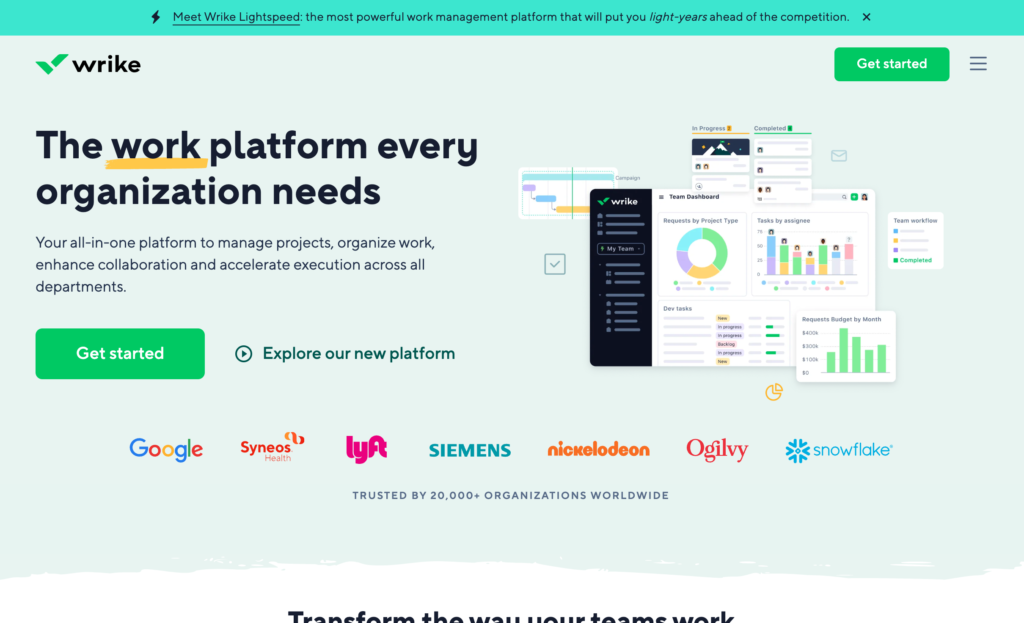
Company History: Wrike was created in 2006 by Andrew Filev and now has its headquarters in San Jose, California, USA. The company began with the development of a collaborative project management tool and has since expanded to offer a range of solutions for marketing, creative, and professional services.
Products and Services: Wrike’s products include Wrike for Marketers, Wrike for Professional Services, and Wrike for Teams. They help teams collaborate, track progress, and manage projects.
Customers: Wrike has a diverse customer base, ranging from small startups to large enterprises.
Market Leadership: Wrike is considered a market leader in the project management and collaboration software industry, with a user base of over 20,000 customers and has been recognized by industry analysts, such as Gartner and Forrester.
Company Culture: Wrike has a strong company culture that emphasizes teamwork, transparency, and flexibility. The company values diversity and inclusion and encourages employees to take ownership of their work.
Growth and Expansion: Wrike has experienced rapid growth and expansion since its founding. The company was acquired by Citrix in 2018 and has since become a standalone business within the Citrix portfolio. It’s also expanded through partnerships and integrations with other software companies, including Adobe and Salesforce.
Overall, Wrike is a leading SaaS company that has revolutionized the way teams collaborate and manage projects.




